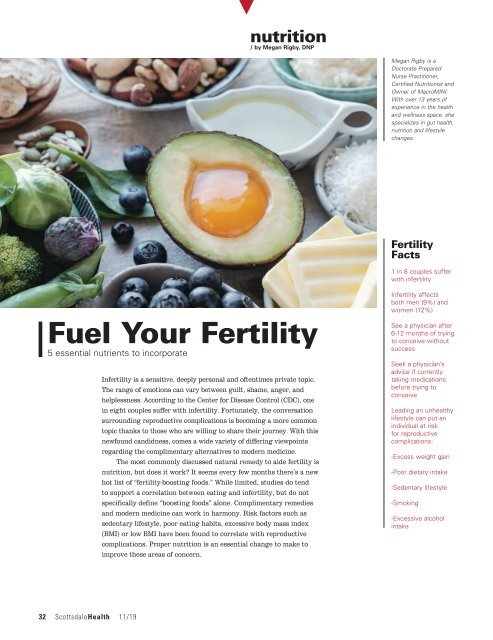Scottsdale Health November 2019
You also want an ePaper? Increase the reach of your titles
YUMPU automatically turns print PDFs into web optimized ePapers that Google loves.
nutrition<br />
/ by Megan Rigby, DNP<br />
Megan Rigby is a<br />
Doctorate Prepared<br />
Nurse Practitioner,<br />
Certified Nutritionist and<br />
Owner of MacroMINI.<br />
With over 13 years of<br />
experience in the health<br />
and wellness space, she<br />
specializes in gut health,<br />
nutrition and lifestyle<br />
changes.<br />
Fertility<br />
Facts<br />
1 in 8 couples suffer<br />
with infertility<br />
Fuel Your Fertility<br />
5 essential nutrients to incorporate<br />
Infertility is a sensitive, deeply personal and oftentimes private topic.<br />
The range of emotions can vary between guilt, shame, anger, and<br />
helplessness. According to the Center for Disease Control (CDC), one<br />
in eight couples suffer with infertility. Fortunately, the conversation<br />
surrounding reproductive complications is becoming a more common<br />
topic thanks to those who are willing to share their journey. With this<br />
newfound candidness, comes a wide variety of differing viewpoints<br />
regarding the complimentary alternatives to modern medicine.<br />
The most commonly discussed natural remedy to aide fertility is<br />
nutrition, but does it work? It seems every few months there’s a new<br />
hot list of “fertility-boosting foods.” While limited, studies do tend<br />
to support a correlation between eating and infertility, but do not<br />
specifically define “boosting foods” alone. Complimentary remedies<br />
and modern medicine can work in harmony. Risk factors such as<br />
sedentary lifestyle, poor eating habits, excessive body mass index<br />
(BMI) or low BMI have been found to correlate with reproductive<br />
complications. Proper nutrition is an essential change to make to<br />
improve these areas of concern.<br />
Infertility affects<br />
both men (9%) and<br />
women (12%)<br />
See a physician after<br />
6-12 months of trying<br />
to conceive without<br />
success<br />
Seek a physician’s<br />
advice if currently<br />
taking medications<br />
before trying to<br />
conceive<br />
Leading an unhealthy<br />
lifestyle can put an<br />
individual at risk<br />
for reproductive<br />
complications:<br />
-Excess weight gain<br />
-Poor dietary intake<br />
-Sedentary lifestyle<br />
-Smoking<br />
-Excessive alcohol<br />
intake<br />
32 <strong>Scottsdale</strong><strong>Health</strong> 11/19

















